随着哈佛大学和麻省理工学院面临持续的抗议,一个教训正在显现:谈判可以有所帮助

【中美创新时报2024 年 5 月 8 日编译讯】(记者温友平编译)随着毕业典礼的临近,哈佛大学和麻省理工学院的校长在近乎持续的骚乱的艰难一年中面临着对其领导力的新考验:和平解决与抗议的亲巴勒斯坦学生的对峙。《波士顿环球报》记者希拉里·伯恩斯(Hilary Burns) 对此作了下述报道。
麻省理工学院的莎莉·科恩布鲁斯(Sally Kornbluth)和哈佛大学临时校长艾伦·加伯(Alan Garber)面临着来自学生、校友和教师的巨大压力,要求他们找到解决占领校园部分校园的抗议活动的方案。各学院表示,营地和抗议者违反了规则和政策,扰乱了教育活动和大学运营,学院威胁要采取纪律措施。
但是,到目前为止,他们的努力都失败了:周一,两所学校都威胁要让抗议者停课;学生们忽视了他们。麻省理工学院校园警察试图阻止学生重新进入克雷斯吉草坪上的围栏营地;示威者推倒隔离墙并返回。
两位领导人已经看到其他大学的同事如何对他们的营地采取不同的方法,并取得截然不同的结果。在少数情况下,抗议者自愿拆除营地。当警察介入时,其他地方则陷入了难以磨灭的混乱和暴力场景。
到目前为止,一个重要的教训似乎正在浮现:谈判可以帮助避免最坏的结果。
“这是一个非常复杂的问题,”前波士顿警察局长埃德·戴维斯(Ed Davis)说,他最近几周为一些设有营地的大学提供了建议。 “如果有办法妥协,那就是最好的办法。但这必须是一个合乎逻辑的妥协。”
例如,上个月,布朗大学是新英格兰最活跃的亲巴勒斯坦校园团体的所在地,在该大学同意听取他们的呼吁,从“为以色列占领巴勒斯坦领土提供便利的公司”撤资后,该校的学生们同意拆除他们的营地。咨询委员会将在 9 月 30 日之前提出建议,并将于 10 月提交给布朗大学理事会进行投票。
这笔交易已经引起了一些校友的愤怒。 据《纽约时报》报道,亿万富翁巴里·斯特恩利希特称这笔交易“不合理”,并表示他已暂停向布朗捐款。
戴维斯表示,布朗的决议是结束营地的“最佳情况”。他说,大学管理人员不需要屈服于所有学生的要求,但他们应该仔细倾听和平的学生活动人士的意见,看看能否达成协议。
他说,报警逮捕学生应该是最后的手段,如果接到报警,他们“需要保持极大的克制,并且需要尽可能安静地进行。”周二清晨,警察抵达芝加哥大学,令抗议者感到惊讶,并拆除了一个营地,但没有逮捕任何人。
其他校园的警察行动则更加动荡。德克萨斯州奥斯汀当局在两周内两次镇压德克萨斯大学奥斯汀分校的亲巴勒斯坦抗议者。哥伦比亚大学校长内马特·沙菲克表示,上周抗议者占领了一所校舍,管理人员“别无选择”,只能报警,这是一个月内第二次。
言归正传,在新罕布什尔州,警察于 5 月 1 日抵达达特茅斯学院,就在学生抗议者搭起一小群帐篷并逮捕了 90 多人后几个小时,其中包括被推倒在地的达特茅斯历史教授安妮莉丝·奥尔莱克 (Annelise Orleck) 。
4 月 30 日,在加州大学洛杉矶分校,亲巴勒斯坦抗议者与反抗议者发生冲突,后者试图拆除营地周围的路障。据报道,警察和校园保安等待了一个多小时才对这两群人进行干预,其中包括向营地投掷烟花的反抗议者。
加州大学洛杉矶分校法学教授尤金·沃洛赫 (Eugene Volokh) 表示:“警察就在附近,但他们连续几个小时都没有被告知要进去解决这个问题,这令人震惊。” “这似乎很难证明其合理性。”
警方随后返回并逮捕了200多人。
曾多次参观麻省理工学院营地的州众议员迈克·康诺利表示,他认为大学管理人员应该“对自己的学生组织者表现出更多的耐心、更多的宽容和更多的尊重”。 “并努力吸引这些抗议者。”
但沃洛克表示,加州大学洛杉矶分校各群体之间的冲突表明,如果大学等待太久才执行校园政策,就会面临风险。
沃洛克说:“大学应该找出什么是正确的内容中立规则,适用于所有政治派别的所有抗议者,然后执行它们。”
麻省理工学院和哈佛大学的学生抗议者似乎决心留在原地,直到他们的要求得到满足。哈佛抗议者希望学校披露并撤回与以色列有关的投资;麻省理工学院的学生活动人士希望该机构终止与以色列国防部相关的研究项目。
麻省理工学院计算机科学与人工智能实验室一年级博士生巴尔塔萨·迪尼斯 (Baltasar Dinis) 表示:“我们在这里,我们会坚持下去,不会动摇。”
两所学校的教职员工都明确表示,他们不希望看到其他校园出现暴力和丑陋的场面。
“我希望学生的安全是最重要的,”麻省理工学院科学史教授肯尼思·曼宁说。 “我希望大学能够找到实现这一目标的方法。”
考虑到已经过去了多少时间以及学期即将结束,一种方法可能是采取更加不干涉的方法。
华盛顿特区的一个智囊团的警察行政研究论坛执行主任查克·韦克斯勒 (Chuck Wexler) 表示:“如果他们只是处于不阻碍其他学生、不威胁其他学生的区域,那么大学必须决定将这些学生驱逐出去有多重要。”
不过,营地的批评者表示,这些营地具有破坏性,让抗议者独处会给犹太学生营造一个充满敌意的环境。哈佛犹太校友联盟几个月来一直对校园内的亲巴勒斯坦宣传表示不满,他们声称这种宣传有时会演变成反犹太主义,让一些犹太学生因被认为效忠以色列而感到被排斥和欺负。
麻省理工学院学生和管理人员之间的谈判迄今为止尚未成功。该大学周二表示,目前正在处理数十起临时停学和移交学校纪律委员会的案件。
在哈佛大学,校园高层领导拒绝会见抗议者,这激怒了组织者和教职员工。截至周二下午,300 多名哈佛大学教授签署了一封公开信,呼吁大学领导人“与和平抗议的学生会面并进行有意义的对话”。
哈佛管理人员不会对他们拒绝与学生交谈的行为发表评论。
加伯在周一向社区发出的信息中似乎解决了一些关于反犹太主义的担忧,他在信息中表示,管理人员“对越来越多的报道感到不安,这些报道称营地内的一些人和一些支持者恐吓和骚扰我们社区的其他成员。 ”
然而,几位哈佛大学的教授和学生告诉《波士顿环球报》,营地是非暴力的,而且大多很安静。
担任管理人员和学生组织者之间联络人的哈佛大四学生什拉达·乔希 (Shraddha Joshi) 表示,哈佛抗议者表示,校园领导无视他们的会面要求,让他们感到沮丧。
组织者首先要求在2024年 1 月 10 日与加伯会面。据《波士顿环球报》查看的电子邮件显示,一名行政助理表示她将重新联系确定日期。学生组织者表示,这次会议从未安排过。
乔希说:“通过适当渠道进行善意对话的尝试已被终止,并促使学生进行公民不服从。”
《波士顿环球报》工作人员艾琳·道格拉斯 (Erin Douglas) 以及记者艾娃·伯杰 (Ava Berger)、马利亚·埃利斯 (Maliya Ellis) 和麦迪·考 (Maddie Khaw) 对本报告做出了贡献。
题图:一名抗议者在哈佛营地悬挂巴勒斯坦国旗。LANE TURNER/GLOBE STAFF
附原英文报道:
A lesson is emerging as Harvard and MIT face continuing protests: Negotiating can help
By Hilary Burns Globe Staff,Updated May 7, 2024
A protester hung a Palestinian flag at the Harvard encampment.LANE TURNER/GLOBE STAFF
As commencement draws near, the presidents of Harvard and MIT are facing a new test of their leadership in what’s been a grueling year of near-constant tumult: peacefully resolving their standoff with protesting pro-Palestinian students.
Sally Kornbluth of MIT and interim Harvard president Alan Garber are under immense pressure from students, alumni, and faculty to find a resolution to the protests that have taken over parts of their campuses. The colleges say the encampments and protesters are breaking rules and policies, and have disrupted educational activities and university operations, and the colleges have threatened disciplinary measures.
But, so far their efforts have failed: On Monday both schools threatened to suspend protesters; the students ignored them. MIT campus police tried to keep students from reentering the fenced encampment on Kresge Lawn; demonstrators ripped down the barrier and moved back in.
The two leaders have seen how colleagues at other universities took divergent approaches to their encampments, with dramatically different results. In a few cases, encampments were taken down voluntarily by protesters. Others devolved into indelible scenes of chaos and violence when police moved in.
So far, one big lesson seems to be emerging: Negotiation can help avoid the worst outcomes.
“It’s a very complex issue,” said Ed Davis, the former Boston police commissioner who has advised some colleges with encampments in recent weeks. “If there’s a way to compromise, that’s the best way to go. But it has to be a logical compromise.”
Last month, for example, students at Brown University, home to one of the most active pro-Palestinian campus groups in New England, agreed to remove their encampment after the university agreed to hear their call to divest its endowment from “companies that facilitate the Israeli occupation of Palestinian Territory.” An advisory committee will provide a recommendation by Sept. 30, which will be brought to Brown’s governing board for a vote in October.
The deal has already provoked the ire of some alumni; billionaire Barry Sternlicht called the deal “unconscionable,” The New York Times reported, and said he has suspended donations to Brown.
Davis said Brown’s resolution is a “best-case scenario” for ending an encampment. College administrators don’t need to capitulate to all student demands, he said, but they should listen carefully to peaceful student activists to see if an agreement can be reached.
Calling in police to arrest students should be a last resort, he said, and if called, they “need to come in with significant restraint, [and] it needs to be done as quietly as possible.” At the University of Chicago, police officers arrived early Tuesday morning, surprising protesters and dismantling an encampment without arrests.
Police actions at other campuses were much more turbulent. Authorities in Austin, Texas, cracked down on pro-Palestinian protesters at the University of Texas at Austin twice in two weeks. Columbia University president Nemat Shafik said administrators “were left with no choice” but to call the police last week for the second time in a month when protesters took over a school building.
Closer to home, in New Hampshire, police arrived at Dartmouth College on May 1 just a few hours after student protesters set up a small group of tents and arrested more than 90 people, including Dartmouth history professor Annelise Orleck, who was shoved to the ground.
At the University of California Los Angeles, pro-Palestinian protesters clashed with counterprotesters on April 30 after the latter group attempted to take down a barricade surrounding the encampment. Police and campus security reportedly waited more than an hour to intervene between the two groups, which included the counterprotesters throwing fireworks at the encampment.
“The police were around, but they weren’t told to actually go in and break this up for hours on end, which is shocking,” said Eugene Volokh, a law professor at UCLA. “It seems very hard to justify.”
Police later returned and arrested more than 200 people.
State Representative Mike Connolly, a Democrat who has visited MIT’s encampment several times, said he thinks college administrators should “show more patience, more tolerance, and more respect for their own student organizers,” Connolly said. “And work to engage these protesters.”
But Volokh said that the clash between the groups at UCLA shows the risks universities face if they wait too long to enforce campus policies.
“Universities should figure out what are the right content-neutral rules that would be applicable to all protesters of all political stripes, and then enforce them,” Volokh said.
Student protesters at both MIT and Harvard seem determined to stay put until their demands are met. Harvard protesters want the school to disclose and divest investments related to Israel; MIT student activists want the institution to end research projects tied to the Israeli Ministry of Defense.
”We are here and we’re holding fast, and we will not be moved,” said Baltasar Dinis, a first year PhD student in MIT’s Computer Science and Artificial Intelligence Laboratory.
Faculty members at both schools have made it clear they do not want to see the violent and ugly scenes witnessed at other campuses.
“I want the safety of the students to be paramount,” said Kenneth Manning, MIT professor of the history of science. “I’m hoping the university will find ways to make that happen.”
One way could be, given how much time has passed and how close the end of the semester is, to take a more hands-off approach.
“If they are simply in an area that is not blocking other students, not threatening other students, then the university has to decide how important is it to have those students removed,” said Chuck Wexler, executive director of the Police Executive Research Forum, a think tank in Washington, D.C.
Critics of the encampments say they are being disruptive, though, and leaving the protesters alone contributes to a hostile environment for Jewish students. The Harvard Jewish Alumni Alliance has for months voiced frustration about pro-Palestinian advocacy on the campus, which they allege at times devolves into antisemitism and leaves some Jewish students feeling ostracized and bullied for perceived allegiance to Israel.
Negotiations between students and administrators at MIT have so far been unsuccessful. The university said Tuesday that dozens of interim suspensions and referrals to the school’s Committee on Discipline are in process.
At Harvard, top campus leaders have refused to meet with protesters, which has infuriated both organizers and faculty members. By Tuesday afternoon, more than 300 Harvard professors had signed an open letter calling on university leaders to “meet and engage in meaningful dialogue with peacefully protesting students.”
Harvard administrators will not comment on their refusal to talk with the students.
Garber seemed to address some of the concerns about antisemitism in his message to the community on Monday, in which he said administrators are “troubled by increasing reports that some within, and some supporting, the encampment have intimidated and harassed other members of our community.”
Several Harvard professors and students, however, told the Globe the encampment has been nonviolent and mostly quiet.
The Harvard protesters say they’re frustrated campus leaders have ignored their requests to meet, said Shraddha Joshi, a Harvard senior who acts as a liaison between administrators and student organizers.
Organizers first requested a meeting with Garber on Jan. 10. An executive assistant said she would be back in touch with dates, according to emails reviewed by the Globe. Student organizers say the meeting was never scheduled.
“Good-faith attempts for dialogue through proper channels have been shut down, and prompted students to pursue civil disobedience,” Joshi said.
Erin Douglas of the Globe staff, and correspondents Ava Berger, Maliya Ellis, and Maddie Khaw contributed to this report.

